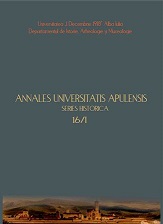Date documentare noi asupra studiilor episcopului Ioan Giurgiu Patachi (1681-1727): Conclusiones philosophicae, Roma, 1706
New Documentary Data on the Studies of Bishop Ioan Giurgiu Patachi (1681-1727): Conclusiones philosophicae, Rome, 1706
Author(s): Iacob MârzaSubject(s): History
Published by: Editura Mega Print SRL
Keywords: Ioan Giurgiu Patachi; Collegium Germanicum et Hungaricum; Conclusiones philosophicae; philosophy; theological education
Summary/Abstract: The life and work of the Greek-Catholic Bishop Ioan Giurgiu Patachi (1681-1727) convincingly illustrates the triad: church, politics, culture with reference to Romanians from Transylvania during the Enlightenment century, before the moment Inochentie Micu-Klein. The period in which the Bishop’s See from the Romanian Uniate Church remained vacant and the period in which Ioan Giurgiu Patachi held the position of bishop (1723-1724) must be understood as stages and moments in the evolution of the Church as an institution in close relation with the main local, regional and central problems (focused on the strengthening of the Union) that characterize an epoch full of political and social disturbances within the Transylvanian Principality. The new orientation in the governance of the Church was honored by the Bishop’s activity, high prelate and baron, who had a very good material and social position. From this position, the scholar and the high prelate Ioan Giurgiu Patachi, a doctor in Theology in Rome and owner of an interesting and valuable library, tried to renew the institution of the Church. From his high intellectual position he tried to represent with honour the situation of the Romanians from Transylvania during the period of their becoming a nation. As a result of new research and library investigation, new documentary data are revealed on his university studies as a continuation of the school period in Gherla and of the Jesuit College in Cluj (Rethorica). In Vienna, he reads courses at Collegium Pazmanianum (Logica et Physica) from 1705 to 1710 and he becomes acquainted with the rector Gabriel Hevenesi, who recommends him for the continuation of his studies at Collegium Romano-Germanicum (Sectio Hungarorum), in Rome (1706-1710). The period of his studies in Rome is illustrated in our article with the text Conclusiones philosophicae, Rome 1706 (to be found at the Library of the Romanian Academy in Cluj-Napoca, Ms. Lat. 68) and which is reproduced in the Appendix of the research. The document which is also printed by the printing house Komarek, „prope Turrin de Grilo”, contains publicly tackled topics in philosophy „[...] in Collegio Romano à Joannes Constantino Patakij Transylvano, Dioecesis Strigoniensis, Collegii Germanici et Hungarici Alumno, Anno 1706 mense Augusto, die 17 horâ [...]”. This documentary source illustrates some of the dimensions of high theological education under the patronage of Societas Jesu. The student Ioan Constantin Patachi was acquainted with subtle topics in philosophy (logics, physics, metaphysics, etc.), without neglecting theological discussions on the universe, the sky, the creation, the moral perversion, the soul etc.
Journal: Annales Universitatis Apulensis Series Historica
- Issue Year: 16/2012
- Issue No: 1
- Page Range: 343-353
- Page Count: 11
- Language: Romanian
- Content File-PDF

